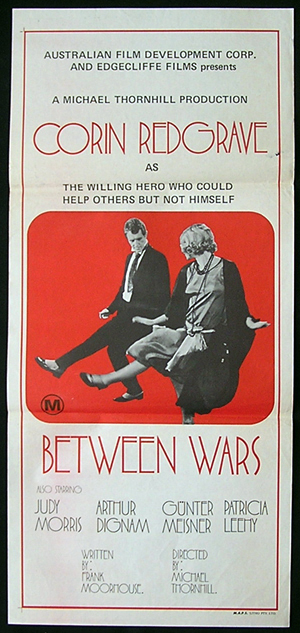
BETWEEN WARS
Australia, 1974, 101 minutes, Colour.
Corin Redgrave, Judy Morris, Gunter Meissner, Arthur Dignam.
Directed by Michael Thornhill.
Between Wars is a worthwhile film, an Australian work that deserves support and will satisfy most audiences. Avoiding ocker images and more recent sensational styles, director Michael Thornhill (former 'Australian' critic) and writer Frank Moorehouse have chronicled the period 1917-1944 for an Australian doctor. The film is episodic – one would like to have much more – and characterisation, except for Corin Redgrave's doctor, lacks roundness. But, that said, the episodes are well-constructed and of great interest, utilising locations well (except for French gum-tree trenches). The film also raises many issues about our past – especially psychiatry, the politics of the late 30s and 40s.
1. What was the overall impact of this film and its quality? Was it an enjoyable film? Why?
2. Comment on the qualities of production; techniques, Australian history, comedy aspects, the quality of the acing, sets and design, costumes and period, musical background, recreation of atmosphere and times.
3. How did the film provide a broader image of the Australian way of life than Australian comedy? Comment on its attack on narrowmindedness and the narrow image e.g. psychology, asylums, communist scares, the quality of patriotism, the role of censorship.
4. What insight into the period did the film give? Changes in the world and people from one war to another? What were the major factors in the change?
5. How pessimistic a view of people and their lives did the film take? What was hopeful about human achievement? Or did it hold low hopes for people changing their lives and other people?
6. How successful was the device of focusing on Trenbow, for the study of the times? Was he a successful character? Was he portrayed interestingly? As an appropriate focus for the times? How well drawn were the other characters in comparison to Trenbow? Did this alter the impact of the film?
7. Consider Trenbow as a man; in the various periods portrayed? Did he grow, how did he change, was he a man in his times, or was he a man ahead of his times? What kind of man was he? As a man of vision, as a doctor? The nature and quality of his work, his role in his family? The drink in his life? His loyalties to friends? What had he achieved by the end of the World War? How much self-respect did he have?
8. What insight into the 1918 period did the segment give? The -portrayal of war and its violence, the physical wounds, the psychological difficulties? The quality of the trench sequences? The criticisms of Trenbow for his psychology? Hook and the way that he ran the convalescent home? Medical discussion about alienists and psychologists? Schneider and Trenbow's looking after him? The influence of Schneider and his Freudian What did Trenbow learn? As illustrated by the soldier who was vomiting? Peter Avante and his friendship with Trenbow and his learning psychology?
9. What insight was given into the 1920's? The picture of Australia after World War War I? Life in the asylum and psychological work there? Australian reaction to Freud? The difficulty of medical experimentation? The investigation and Royal Commission? Narrowness of attitudes? Vindication by the judge? Trenbow learning and Avante learning? The human elements in Trenbow's life? His relationship with his parents and Deborah's parents? The humour and insight from the wedding rehearsal? The sequence from the fete (beginning and ending with the inmate in the asylum), the University speech? The tennis sequences? Trenbow's options as regards his future and his work?
10. What insight was given in the 1932 segment? How well was the passing of time portrayed? Life in a New South Wales country town? The role of the doctor? His ordinary patients and his treatment and style? Trenbow's family, the banjo sequence, his relationship with his son and his son's resentment? Trenbow's drinking? The friendship with Backhouse? Susan's arriving and the questions about her psycho-analysis? Her hold on Backhouse, on Trenbow. The success of his treatment? How well was psychoanalysis portrayed? Deborah's capacity for living with this? The social overtones of the time? The Fisherman's Co-operative and the meeting? The role of the paper? The communist smears? The importance of the picnic sequence and the National Guard clashing? Police dispersing it? The impact of all this on Trenbow and his beliefs? The support of Deborah and her belief In the Co-operative? Why would he return to Sydney?
11. The insight given in the 1941 segment? Trenbow in Macquarie St as a success? Avante as a success and taking it for granted? A different war atmosphere? The internment of Schneider and its effect on Trenbow? Susan's business-like approach and patriotism? Her unwillingness to help Trenbow? Audience response to this? Rodney and his attitude towards his father? Red Deborah's change over this period? The importance of the broadcast sequence and its being censored? Trenbow's visiting Avante’s party and the superficial party during war time? The Australia First Meeting and its style? Audience response to the invasion of privacy and the raid? The ending with Rodney going to the war? What had Trenbow achieved? (The light humour of Rodney at the concert?)
12. How good a film was this? As a human document ,as an Australian film, as a glimpse of history, as a portrayal of time passing, as a portrayal of change?